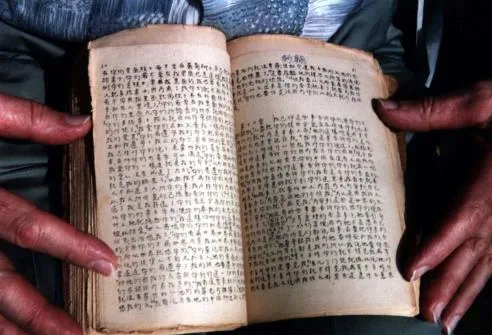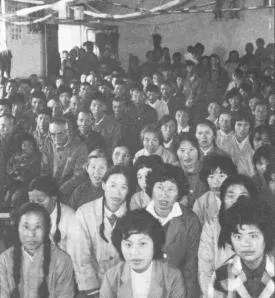A Famine of God's Word
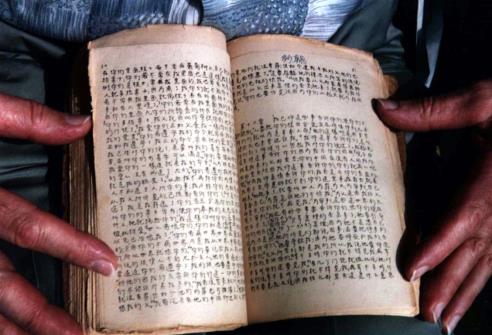
A precious hand-written Chinese Bible.
The 1980s brought fresh hope to many Christians throughout China. Several years had passed since the end of the Cultural Revolution, and promises of greater liberties were being made not only to people of faith but to the country as a whole.
Despite three decades of persecution and having been cut off from the Body of Christ around the world, the Church in Shandong had not only survived the dark times but had flourished in the crucible of testing. In the early 1980s, veteran missionary Leslie Lyall reported that the churches in Shandong were "experiencing tremendous growth, and cottage meetings have multiplied. In Jinan, the provincial capital, there are reported to be 20,000 believers. In the picturesque port city of Qingdao over 1,000 Christians attend Sunday worship, and in Yantai over 600." 1
In 1985, one visitor to a church in eastern Shandong reported:
"The church has about 60 members...most of whom attended the Lord's Supper, when they knelt down in groups of five or six. The pastor blessed each one personally, giving a word of encouragement or exhortation before dispensing the bread and wine, which they drank from one cup. Many were weeping and openly confessing their sins before the Lord.
The pastor of the church is over 70-years-old and widely respected as a house church leader. He was arrested in the 1950s and imprisoned for about 20 years. The Christians here are short of Christian literature. However, they are afraid to receive material even posted within China. The leaders and some of the members have Bibles, but most of the young converts do not have the Scriptures. They are, however, happy to receive material hand-carried in." 2
The Church in Shandong had grown throughout the 1970s despite severe hardship and persecution. Although the number of believers had mushroomed at the start of the 1980s, the Body of Christ faced a crucial roadblock—the lack of Bibles.
Bibles had been banned throughout China for nearly three decades, and many believers who owned a copy of God's Word during the Cultural Revolution had been afraid to reveal them, as being found with a Bible could result in their arrest and the grim possibility of many years in prison. As a result, Bibles were placed inside airtight canisters and buried in the ground, while others were skilfully concealed inside the wall panels or rafters of homes and barns.
Veteran American missionary Paul Kauffman, who founded Asian Outreach, attended a registered church in Shandong the early 1980s, when a lady sitting next to him reached into her bag and casually pulled out a huge old Chinese Bible with ragged edges. Surprised, Kauffman turned to her and asked where she got it. "Oh, it was my mother's Bible," she replied.
The missionary asked if the Red Guards had searched her home. "Yes," the woman confirmed, "but mother had hidden the Bible under the eaves of the house. See? The rats have eaten the edges of the leather binding, and my mother has gone on to be with the Lord, but I still have her Bible." 3
Believers throughout Shandong yearned and prayed for a day when they could once again access God's Word without fear of reprisal, but the acute shortage of Bibles resulted in hand-copied pages being circulated around the churches. Many Christians memorized a portion before swapping their page with someone who possessed another page or two of the precious Scriptures.
As more people desired to replace the spiritual void in their hearts by following Jesus Christ, the lack of Bibles slowed down the advance of God's kingdom, and threatened to derail it completely.
The Turning Point
The Chinese Church cried out to God for mercy, asking Him to feed His starving children. In response, in the late 1970s a strongly-built American missionary, known as Brother David, responded to a call from God to help courier Bibles into China from neighboring countries. Starting by carrying just a few Bibles inside his bag, the initiative grew until teams with a dozen or more travelers hauled hundreds of Bibles across the border from Hong Kong each day.
Although the Scriptures that Brother David and others managed to smuggle into China were a tremendous blessing to the recipients, the scale of the need ensured those Bibles were akin to trying to douse a blazing forest fire with a garden hose. David and his co-workers came up with a risky, Holy Spirit-inspired plan to deliver one million Bibles into China in a single day. This bold delivery, which came to be known as Project Pearl, was bitterly opposed by many other mission groups, who were concerned the plan was just too bold and brazen. Others appeared upset and envious that the huge project was discreetly implemented without their knowledge or participation. 4
Inside China, however, the Body of Christ cared little about the political manoeuvrings of the outside Christian world. They didn't particularly care how Bibles reached them. They were desperate for the Scriptures, and realized the future of Christianity in China depended on whether or not new babes in Christ could be able to access God's Word.
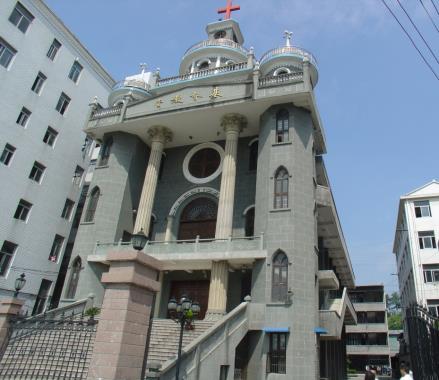
Some of the one-million Bibles on the barge that entered China in July 1981. [Brother David]
After years of planning and one aborted attempt, Brother David and a group of dedicated missionaries finally launched out from Hong Kong aboard a tugboat in June 1981, pulling a barge containing one million Chinese Bibles. Realizing that if they were caught they faced possible execution or at least many years in prison, Brother David successfully led his crew on one of the most courageous Christian acts of the twentieth century.
With thousands of Chinese Christians waiting on a beach in Shantou, Guangdong Province, the missionaries unloaded their precious cargo before escaping to the Philippines as quickly as possible.
Although the Chinese authorities managed to confiscate about 10,000 Bibles after they realized what had taken place under their noses, the overwhelming majority of the one million Scriptures were successfully delivered and distributed to astonished church leaders the length and breadth of China.
In the aftermath of the Project Pearl delivery, reports of powerful heaven-sent revival came in from across China. Many Chinese believers told of the role the Bibles played in fanning the flames of revival. The audacious delivery was the turning point for the house church movement in China. One pastor later said,
"The delivery was the spark that set many house churches alight, as believers gained strength and faith from God’s Word. Looking back with the hindsight of years, I believe the timing of Project Pearl was God-ordained. In 1981 the harvest in China was ripe and the believers were desperate for God’s Word. In a sense, if we had done the delivery a few years later the impact might not have been quite as great." 5
Among the hundreds of letters of appreciation received by Brother David and his ministry in the aftermath of the delivery were some from Shandong Province, where tens of thousands of Bibles had successfully reached the churches. One letter, signed by 'The Church at Yanzhuang' (a town in southern Shandong), explained the impact the Bible delivery had on their church:
"Now we have Bibles and everyone can study the Word of God. The flock that is hungry and thirsty can now feed on wholesome spiritual food, and drink from the pure spiritual fountain. Our lives are now flourishing like healthy trees in spring time. Many have believed in the Word of the Lord and have endured trials. Now we have learned to stand firm, discern true from false, and stand against the evil one and all of his attacks.
The Word of God really is a lamp unto our feet and a light unto our paths. It is our foundation and we will stand on it forever. The flock is now making great progress in the pursuit of spiritual maturity. We know that prayer provides power, and realize how sweet it is to commune with the Lord early in the morning. Praise the Lord!
We fully understand that the Bibles did not come to us easily. We know that for the suffering Church and the spiritual needs of the flock you did your best. Brothers and sisters, your labor is not in vain. Your love has blessed numerous congregations and has awakened many who were drunk in this world, saving a multitude of souls.
We have learned from your example of selfless love and we share your desire to spread the gospel throughout the whole earth, so that the Church will be revived and bring much glory to the Name of the Lord.
Please pray for us often. All the brothers and sisters in our church greet you.
Emmanuel,
The Church at Yanzhuang." 6
A Missionary's Surprise
After Deng Xiaoping assumed power in China in 1978, his new open-door policy brought swift economic reforms and ushered in a new era for the Church. After having been closed off from the rest of the world for three decades, foreign Christians were now able to travel into China, and astonishing reports emerged of revival in many areas where it was previously assumed the churches had been wiped out.
Paul Kauffman, the late founder of Asian Outreach, was born to missionary parents in Qingdao in 1920. After serving on the Tibetan border for years, Kauffman's father, Ivan, relocated to Shandong for his third term of missionary service. Not knowing a soul when he arrived in Qingdao, Ivan Kauffman was walking down a street when a stranger accosted him. His son later shared the story:
"'Pardon me, sir,' said the man in Chinese, 'aren't you the man who has come to teach us about the Holy Spirit?' Startled, my father asked, 'What made you ask?'
The man had been a believer for several years, but heard that a person could be filled with the Holy Spirit. Then, he was told, one would have supernatural power to witness for Christ. He earnestly began seeking God for the gift of the Spirit. One day God gave him a vision in which he saw the face of a Western man. The Lord told him the man was coming to teach him about the Holy Spirit. 'You are the man I saw in the vision,' he said to my father. What a wonderful confirmation of father's guidance in coming to Qingdao. The Holy Spirit had announced our arrival!" 7
In the mid-1980s Paul Kauffman returned to the town of his birth after an absence of almost six decades. His father had been a greatly respected missionary in Qingdao, and the Kauffman Memorial Church was constructed in 1935 to honor his sacrificial service. It had been turned into a factory by the Communists in the 1950s, but was returned and restored as a place of worship in the more tolerant atmosphere of the mid-1980s.
As he caught a taxi to the old church, Paul Kauffman wondered if he would find any believers. He reported,
"Alighting from the car, we were quickly surrounded by believers on their way to the church. The building had been constructed to seat 300, but to our delight we found it was packed with 800 worshippers. People were crammed into every nook and corner. The four walls could hardly contain the worshippers who jammed every window and doorway. This was only the first service; there would be two more services, equally crowded, that morning....
I sat on the crowded platform, tears rolling down my cheeks. It was just like the services I had attended as a boy during the great Shandong Revival. Nothing had been able to extinguish the fire of the Holy Spirit....
Not many in that service knew my father who had died 55 years before. How thrilled father would have been to see the fruit his early efforts had borne." 8
Revival Comes to Southern Shandong
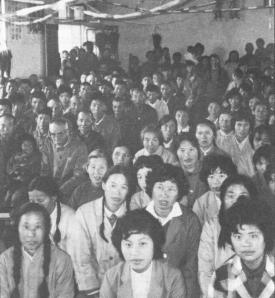
A rural house church meeting in the 1980s.
In the spring of 1989, Pentecostal teaching flooded into southern Shandong after two house church preachers from Zhejiang traveled north into the province. They encountered many formal churches with a Presbyterian root, where most of the believers had never experienced the work of the Holy Spirit. Although large numbers had remained faithful to the Word of God, the faith in many parts of Shandong had become dry and dusty, without much spiritual life or love.
When they heard that two visiting preachers were seeking to preach in their churches, many pastors in southern Shandong gathered together to discuss whether they should grant them permission. When asked what message they intended to share, the humble duo explained that revival from God had broken out throughout China, due to the power and presence of the Holy Spirit. They desired to share what God was doing and to encourage believers to receive God's Spirit. Suddenly a young man stood to his feet and declared in a loud voice,
"'We need the filling of the Holy Spirit. I have desired this for a long time, but didn't have the courage to say so'... The words had hardly come out of his mouth when another man jumped to his feet and said in a loud voice, 'In my heart I am so bored. The church is boring me to death. We must have a revival meeting!'" 9
Many church-goers shared a similar desire for more of Jesus Christ. A meeting was organized and more than 100 thirsty preachers attended. The meetings started at six o'clock in the morning, and the two preachers from Zhejiang taught on the baptism of the Holy Spirit while testifying to what the Living God was doing in various parts of the country. The Shandong church leaders listened attentively, but many had been warned over the years to be wary of Pentecostal teaching, so there was considerable resistance.
At the conclusion of the second day of meetings, the preachers prayed earnestly for a breakthrough. The next morning, during the intercession time, the brothers laid hands on a young 13-year-old girl. She suddenly stood up and cried out, "Lord, I ask you to have mercy on us!" As soon as the words left her lips,
"The meeting place was shaken and each and every one began to weep loudly, some of them beating their chests and confessing their sins. Many wept bitterly for the lukewarm, backslidden churches in southern Shandong... 90 percent of them were filled with the Spirit, and began to fervently clap their hands and praise out loud. The whole meeting place was shaken as their shouts were like thunder....
On the last day of the meetings the participants asked the two preachers to lay hands on them. As they did so, several people saw a dove hovering about their heads. One brother had been afflicted with arthritis for many years and was not able to move his hands. The preachers laid hands on him and he was immediately healed. Lifting his hands up high he began to dance and praise God." 10
While many of the local pastors were greatly refreshed by the revival meetings, others grumbled against them, with one key elder angrily saying, "This is the work of evil spirits," as he stormed out of the room.
Most of the churches that were led by receptive pastors experienced strong growth in the following months. The work of evangelism expanded quickly, and "in several villages even the government officials believed. In one village, the believers grew in a few months to 80 percent of the population. Out of 600 people, 400 became Christians." 11
On the other hand, the church led by the elder who had walked out of the meeting in disgust decreased from 90 to just 10 believers. Hungry Christians left his church and went to where the Holy Spirit was moving, as bees are automatically attracted to a honey pot.
In the next few years the Zhejiang churches sent many more evangelists and teachers to southern Shandong. During one meeting, a 22-year-old paralytic was carried to the front. He lived alone and his body and hair were filthy. Whenever he saw people all he would do is stare at them and laugh.
By that time the Shandong Christians were boldly ministering in the power of the Holy Spirit. They laid hands on the young man and asked God to deliver him from the grip of the devil in the Name of Jesus. The next evening a clean young man walked into the meeting. Nobody recognized him as the same person who had been carried in the previous day.
Faced with the reality of hundreds of transformed lives that displayed the fruit and gifts of the Holy Spirit, the elder who had opposed the meetings repented with tears and he too was filled with God's Spirit. Revival finally also came to his church.
Footnotes:
1. Leslie T. Lyall, God Reigns in China (London: Hodder & Stoughton, 1985), p. 175.
2. Pray for China (March-April 1985).
3. Paul E. Kauffman, Piecing Together the China Puzzle (Hong Kong: Asian Outreach, 1987), p. 152.
4. For a gripping account of how this Bible delivery succeeded, see Brother David with Paul Hattaway, Project Pearl: The 1-Million Smuggled Bible that Changed China (Oxford: Monarch Books, 2007).
5. Brother David, Project Pearl, p. 263.
6. Letter to Open Doors, July 1981.
7. Asian Report (March-April 1990).
8. Asian Report (March-April 1990).
9. Danyun, Lilies Amongst Thorns (Tonbridge, Kent: Sovereign World Books, 1981), p. 319.
10. Danyun, Lilies Amongst Thorns, p. 320.
11. Danyun, Lilies Amongst Thorns, p. 321.

© This article is an extract from Paul Hattaway's book 'Shandong: The Revival Province'. You can order this or any of The China Chronicles books and e-books from our online bookstore.

